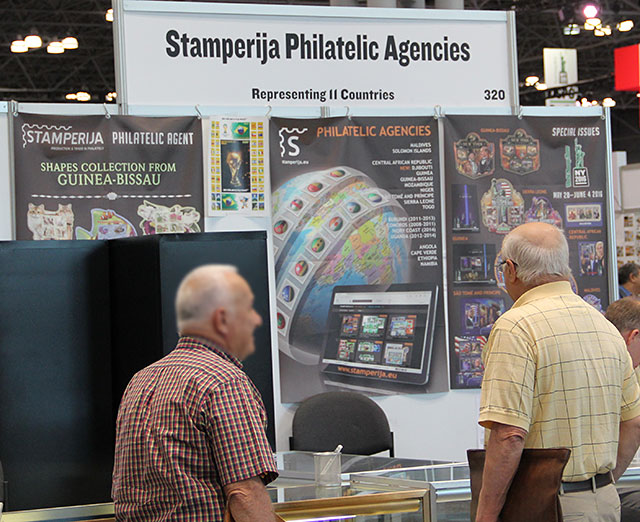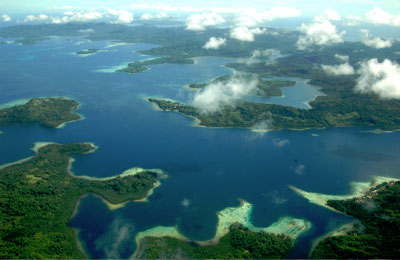Illegal stamps(1), philatelic press and international catalogs
A powerful selling point for Stamperija, agent and publisher of stamps for many countries, is that it can offer its stamp issues on its website with mentioning of the catalog numbers of Michel, Yvert and Scott. I (Victor Manta*) was amazed at the many offers for stamps produced by Stamperija published online by the rather reserved Scott catalog.
I learned from a recent email conversation with one of Scott's officials that Scott's publication criteria do not take into account the code of ethics(2) established by the UPU, and that he just heard of its existence from me... Scott only uses its own publication criteria, which have not changed for decades.
Some philatelic magazines, such as the well-known American philatelic magazine Linn's (related to the Scott catalogs), promote Stamperija products. As an example, here's a headline: "Donald Trump appears by mail on a miniature sheet of the Central African Republic".

A short excerpt from Linn's:
Donald Trump is among those honored as a New York celebrity on a Central African Republic postage stamp. Stamps will be issued commemorating the World Stamp Show-NY 2016, an international stamp show that, from May 28 to June 4, will take place at the Javits Center, 655 W. 34th St., New York. At this fair, the post of the Central African Republic is represented by Stamperija, a postal agent based in Vilnius, Lithuania."

At Stamperija's impressive booth at the World Stamp Show-NY 2016, a salesperson told a customer next to me that the interest in this souvenir sheet is very high and that it is selling very well. Obviously, I was not interested in the spread of such philatelic viruses.
UPDATE: the World Wide Press about the Stamperija issues
In recent years, several African countries have appointed a Lithuania-based organization called Stamperija to design and print their stamps. Stamperija, philatelists shudder at the name, has flooded the market with rubbish. Collectors calculated that Sierra Leone, with a population of 7.6 million and a barely functioning postal service, issued 1566 different stamps in 2016 with the help of Stamperija, compared to 268 issued by Great Britain and 139 by India.
Another example is the Solomon Islands, a former British protectorate in the Pacific. They are trying to recover from a civil conflict that brought the country to the brink of collapse. The World Bank says the Solomon Islands, one of the poorest countries in the Pacific, has been hit by successive global food, fuel and financial crises. You may wonder why the approximately 600,000 residents of the Solomon Islands need 500 different stamps and 150 different stamp sheets per year. Since they don't really need them, and therefore don't use most of them, we can conclude that they were issued to milk the least informed, most naive stamp collectors in the world.

Aerial photo of the Salomons islands (source: wikipedia)
Stamperija's colorful designs are not to everyone's taste. And making so many stamps can lead to mistakes. A set of Stamperija stamps issued for the Central African Republic (CAR) in 2014 turned out not to depict Marilyn Monroe as planned, but a New York drag artist.

But few of Stamperija customers seem to be concerned. "It's a buyer who wants them, a seller who wants to sell," said a Sierra Leone postal worker. "What's the problem?"
(Short excerpt from "The Economist", August 20, 2020(3))
Conclusions
- UPU circulars opposing illegal stamps have almost disappeared, although the number of illegal stamps has not decreased over time.
- The UPU / WADP / WNS has failed in the fight against illegal stamps, registration with WNS remains expensive for the postal administrations (they have already invested millions of Swiss francs) and WNS is full of holes.
- The FIP, apart from its Commission Against Fakes and Forgeries (which has meanwhile been marginalized), does not fulfill its minimal task of preventing illegal and harmful stamps from entering philatelic exhibitions, and thus does not contribute to the younger generations education.
- The philatelic press rarely discusses the influence of these harmful stamps on stamp collecting. Exception are a few philatelic sites, which are usually little known, even if they deal with this painful subject more often.
- Major international catalogs (except Stanley Gibbons) assign catalog numbers to illegal stamps, making them more attractive to the uninitiated.
It is up to the stamp collectors to inform themselves and to take appropriate action.
Note: I have added to this article a brief listing of countries whose illegal and harmful stamps have been distributed through or are circulating on commercial sites.
* About the Author: Victor Manta is the founder and current president of the Philatelic Webmasters Organization (PWO) and the editor of the website www.pwmo.org, which has long fought against illegal stamps. The greatest interest of Mr. Manta goes out to thematic stamps and philately on the internet. The philatelic sites have been awarded many times in competitions. He is also a noted philatelic journalist, who has published numerous articles on the internet and in printed magazines around the world. A first version of the above article has been printed in the March 2020 issue of the well-known French publication Timbres Magazine.
(1) Illegal issues
- Illegal issues are issues that have been definied as such by the "Fight Against Fakes and Forgeries Commission" of the International Philatelic Federation (FIP).
- Forbidden issues are issues that are not complying to the Code of Philatelic Ethics, accepted by the member states of the Universal Postal Union (UPU), as well as to the decision of the FIP from 1976.
- This code has been introduced in 2008 and is approved by all UPU member states. However, some stamps and sheets that are not complying to this code are issued by some postal organizations and are valid for postage!
- They are not sold by national philatelic services, but by agencies or private companies often based outside the country.
- They do not meet the country's internal postal needs and are often not even for sale in the country of issue!
(2) The Philatelic Ethical Code for UPU member states
This has been introduced in 2008 and was approved by all member states of the UPU. Some provisions:
7.6 Draw up separate contractual terms for the printers in charge of producing the stamps and for the agents responsible for marketing them.
7.7 Only outsource the printing of stamps to security printers who have signed the Code of Ethics for Security Printers for Stamps and who have obtained certification as a security printer or have committed themselves to get this.
(3) Wait a minute, mister postman
Why African countries issue stamps in honor of English cricketers: it helps to pay the bills
LEN HUTTON was an experienced cricketer. English fans cherish the record of 364 runs he achieved in a test match against Australia in 1938. However, it would not be strange to assume that this achievement is less noticed in the Central African Republic (CAR), a former French colony without cricket background. So it may seem strange that in 2016 the CAR issued a series of commemorative stamps to mark the centenary of Hutton's birth - and even stranger that French-speaking Niger and Portuguese-speaking Mozambique did the same (see image).

It seems the practice is not limited to bygone English cricketers. Jan Brueghel the Elder died 395 years ago in January, a milestone that Sierra Leone's postal authorities considered important enough to justify a philatelic tribute. Other African states seem to prefer baroque music to Flemish art. It is quite possible that the people of Guinea-Bissau have let the 260th anniversary of Johann Sebastian Bach's death pass without much noise. Fortunately, their postal service was alert.
Stamp issues give countries the opportunity to honor national heroes. Still, there is a motivation for printing stamps with long-dead foreigners. It would be difficult to walk out a post office in Bangui, the backward capital of the CAR, with a Hutton stamp. But collectors who scour the internet are willing to pay nicely for such things. A set of Hutton stamps from the CAR will deliver € 15.50 ($ 18.50). Niger's image of a suitable Hutton is wanted enough to demand a fee of $ 2. This is a useful way for African states to increase revenues.
True philatelists get scared of this kind of things. Stamps should only be issued to meet local demand, they claim. But targeting the collectors market is not new. Smaller and poorer countries have been doing it for 70 years, notes Ian Harvey of the Royal Philatelic Society London. Even the British Royal Mail has been accused of defrauding collectors.
Sources:
PS: Each of us must determine for himself how and what to collect. Whether a stamp is illegal or undesirable in principle only applies to the exhibition collections. I myself only buy stamps from this kinds of countries if there are run pieces, normally franked with motorcycle stamps. Sometimes these countries also have official stamp issues among all the trash. This can be checked in the WNS of the WADA. Besides the illegal issues from Stamperija, we also know the bulk of stamps that appear from the IGPC. Hans de Kloet has previously reported on both firms.
Nico Helling
Appendix: Undesired / illegal stamps
Mr. Bengt Bengtsson, a philatelic jury member from Sweden, established a classification of "underised postage stamps" (March 2001) that he felt should not appear in collections presented at philatelic exhibitions. We (PWO) updated this list by adding a few more countries, based on what we've learned from observing the philatelic market.
Stamps that we should avoid:
|
| Country: |
Period: |
| Ajman |
after 20-05-1967 |
| Equatorial Guinea |
1972 - 1979 |
| Dubai |
20-05-1967 to 1-07-1969 |
| Fujeira |
after 20-05-1967 |
| Isö |
all (not postal) |
| Yemen, kingdom |
after 20-05-1967 |
| Yemen, Republic |
20-05-1967 to 31-10-1972 |
| Kathiri State in Hadhramaut |
all |
| Kathiri State of Seyiun |
after 20-05-1967 |
| Khor Fakkan |
after 20-05-1967 |
| Mahra State |
after 20-05-1967 |
| Malta, Ordino Soverano Militare |
all |
| Maluku Selatan |
all (not postal) |
| Manama |
after 20-05-1967 |
| Nagaland |
all (not postal) |
| Panama |
01-01-1965 to 22-10-1968 |
| Paraguay |
01-01-1965 to 01-09-1967 |
| Qu'aiti State of Hadhramaut |
after 20-05-1967 |
| Ras al Khaima |
after 20-05-1967 |
| Redonda |
all |
| Occidental Sahara (West Sahara) |
all (not postal) |
| Sharjah |
after 20-05-1967 |
| State fo Upper Jafa |
all |
| Umm al Quiwain |
after 20-05-1967 |
| Wikingland |
all (not postal) |
Stamps from countries that have issued too many or too expensive stamps:
|
| Country: |
Period: |
| Antigua & Barbuda |
after 1984 |
| Belize |
1979 to 1987 |
| Bhutan |
after 1964 |
| Bolivia |
sheets after 1972 |
| Burundi |
what is not registered in WNS |
| Chad |
1969 - 1985 |
| Central African Republic |
after 1978 |
| Djibouti |
sheets 1979 to 1987 |
| Dominica |
after 1991 |
| Gambia |
after 1985 |
| Grenada |
after 1984 |
| Grenada - Grenadines |
after 1985 |
| Guinea |
after 1982 |
| Guinea - Bissau |
after 1982 |
| Guyana |
after 1981 |
| Comoros |
after 1975 |
| Congo (Brazzaville) |
after 1990 |
| Guinea |
what is not registered in WNS |
| Guinea - Bissau |
what is not registered in WNS |
| Ivory Coast |
what is not registered in WNS |
| Libya |
sheets 1977 to 1988 |
| Madagascar |
after 1987 |
| Maldives |
after 1990 |
| Mali |
what is not registered in WNS |
| Mozambique |
what is not registered in WNS |
| Niger |
what is not registered in WNS |
| North Korea |
1976 to 1984 |
| Paraguay |
after 1997 |
| St. Vincent |
after 1985 |
| St. Vincent - Grenadines |
after 1985 |
| Salomon Islands |
what is not registered in WNS |
| Sao Tome & Principe |
after 1977 |
| Tanzania |
after 1985 |
| Togo |
1965 - 1990 +
what is not registered in WNS |
| Uganda |
after 1989 |
Top - Back to former page - Home |




